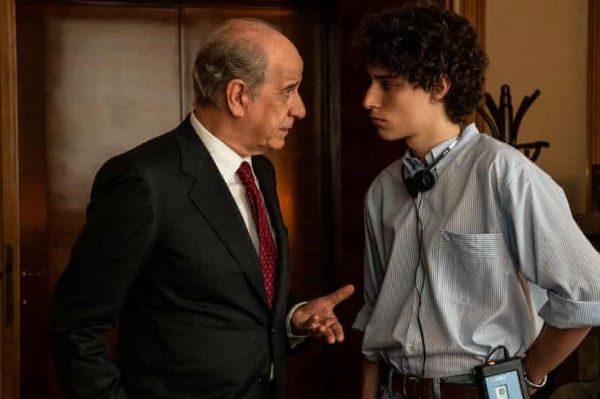17-year-old student Fabietto (Filippo Scotti) has everything he could hope for. His loving, eccentric parents Saverio (Toni Servillo) and Maria (Teresa Saponangelo), a promising future at university, and the prospect of Diego Maradona signing for Naples. However, a tragic accident resulting in the deaths of Saverio and Maria leaves Fabietto adrift and in search of a direction, resulting in him turning to unlikely mentor figures such as smuggler Armando (Biagio Manna) and irascible film director Antonio Capuano (Ciro Capano). Will Fabietto find and pursue the path that best suits him?
Sorrentino provides an intimate insight into his life, expressed through the eyes of Fabietto, that not only captures his experiences with his family, but also the mood of Italy during the summer of 1986, when Maradona was the biggest football star in the world and auditioning for Fellini was still possible.
An extended family dinner introducing Fabietto’s relatives as well as scenes showing Saverio and Maria acting as themselves with their respective foibles on display help to convey the warmth and love that Sorrentino feels for them both in the past as well as the present. Maria’s penchant for pulling pranks on everyone provides a particular recurring comedic highlight, and the closeness of Saverio’s relationship with Fabietto sets up the boy’s subconscious need for a father figure in the film’s second half. The performances of Servillo and Saponangelo help to enhance their respective characters and make them fully-fleshed out, three-dimensional human beings, which makes their absence in the film’s second half all the more effective.
The second half, where Fabietto is effectively alone, proves to be a stark contrast to the secure opening that allows Scotti to fully express the character’s grief as well as his attempts to define himself as an adult. The latter aspect is effectively shown by Sorrentino through a scene with an elderly next door neighbour, which provides Fabietto with an unconventional introduction to sex as well as his friendship with Armando. However, it is Fabietto’s encounters with Capuano that are the most effective, with the latter serving as an unlikely mentor who encourages the teenager’s to pursue his filmmaking dreams without his motivation coming across as forced or contrived.
Whilst Sorrentino goes for a naturalistic approach for most of the film, complementing the ‘slice of life’ nature of the story, he also makes occasional use of surreal imagery to great effect. The chance encounter between Fabietto and Maradona is one example, but the repeated use of the character of the ‘Little Monk’, who appears at the film’s beginning and later during a train journey, is a particularly inspired touch, with Sorrentino appearing to pay homage to Federico Fellini and his use of magic realism through his inclusion.
The Hand of God is a greatly appealing slice of life story that benefits from Sorrentino using a multifaceted approach to conveying his life for the viewer, combining realism with surrealism to great effect, as well as engaging performances from Servillo, Saponangelo and Scotti.
Available on Netflix
